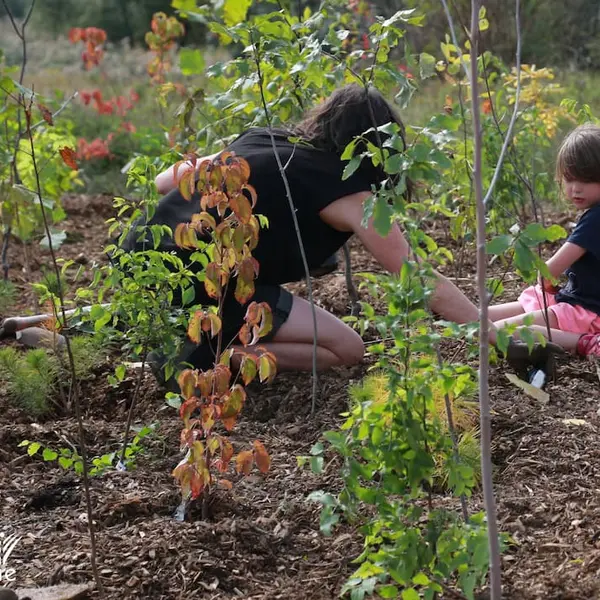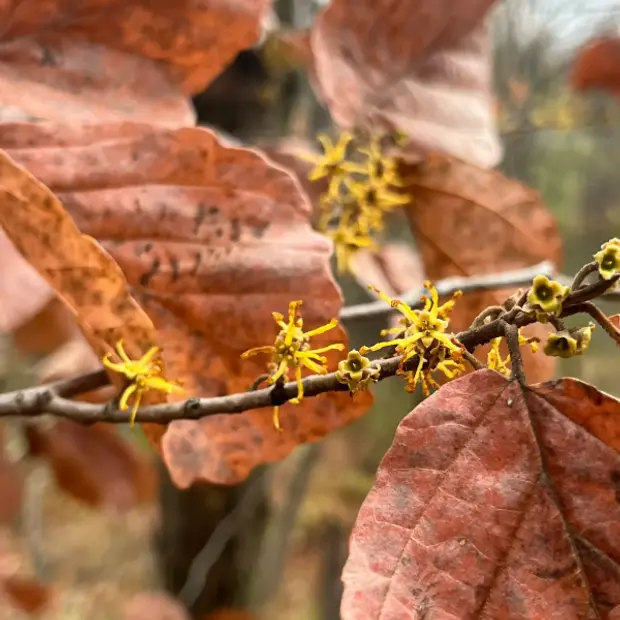Mini Forests
Create more habitat for wildlife and mitigate the impacts of development with mini forests!
Through the Network of Nature we explore opportunities to collaborate with organizations, corporations, and municipalities to plant biodiverse forests. While mini forests can be grown in diverse, small spaces, the ecological impacts are significant.

Small spaces can become rich places for environmental and social health
Mini Forests, also known as tiny forests or Miyawaki forests, are small-scale native urban forests consisting of trees and shrubs. They are created using dense plantings of diverse locally-adapted climax forest species, with soil preparation and multilayered design to mimic the complexity of a native forest.
Mini Forests provide a variety of ecosystem services that benefit people, plants and wildlife, including:
- Mitigating the urban heat island effect by moderating temperature fluctuations
- Providing green spaces for people to enjoy, offering mental health benefits and opportunities for participatory action
- Sequestering carbon and reducing air pollution
- Increasing biodiversity by providing habitat for wildlife
Improving watershed health by reducing runoff and overland flooding through infiltration
We offer planning and installation of mini forests, or support for you to do it yourself! We have comprehensive resources available including a mini forest growth tracker, and training resources.

Better places for ecosystems to thrive are better places for people too.
Mini forests are a strategic way to transform diverse spaces into thriving ecosystems. Join us in our mission to plant, maintain, and monitor mini forests in communities in Canada from coast-to-coast-to-coast.

Frequently asked questions about mini forests
Based on the Miyawaki Method of planting, a mini forest is a dense planting of native trees and understory in a small footprint. Also known as “micro-woodlands”, or “urban afforestation,” mini forests emulate natural forest structures in compact spaces - typically 100–500 m². They provide high biodiversity, carbon storage, shade, and mental health benefits. These forests are ideal for schools, parks, corporate campuses, or infill sites. Ecologists, such as those at Dougan Ecology, can create ecologically-informed species lists and planting plans for robust mini forests.
To boost urban biodiversity, shade, and air quality. Mini forests increase canopy cover, support pollinators and other wildlife, reduce urban heat island (UHI) effects, and sequester carbon. Their layered planting structure mimics natural forest ecology, providing valuable ecological function in dense urban or suburban areas.
Mini forests are usually between 100 to 500 m², depending on site constraints. This size allows a functional forest structure with tree canopy, shrub layer, and groundcover while fitting within parks, schools, or residential yards.
Urban afforestation involves planting native forests within urban environments. Urban afforestation involves establishing compact, biodiverse tree stands in cities to improve ecological health, stormwater control, and community well-being. Mini forests are a practical and impactful form of this approach.
They provide varied support to pollinators across many life stages. A diverse understory of native shrubs, perennials, and groundcovers feeds bees, butterflies, and other insects. The multi-layered canopy boosts nectar and pollen production throughout the year, and twigs, bark, and fallen leaves can provide sites for over-wintering.
Species are chosen for a layered structure and local ecology within a mini forest plan. Typical plantings include a combination of fast-growing canopy trees and native understory and shrubs. If budget allows, it is important to incorporate native groundcovers to stabilize soils and deter invasive species encroachment. Groundcovers also increase overall diversity and support wildlife while trees and shrubs are established.
Mini forests are typically well-established within 3–5 years. While structural maturity occurs over decades, mini forests help create canopy cover and habitat quickly. Root systems, soil biology, and biodiversity establish rapidly through dense planting and soil amendments.
Mini forests are installed using high-density, layered planting methods. Installation involves site preparation such as soil amendments and drainage assessment, followed by dense placement of trees, shrubs, and groundcover. Mulching, protection, and irrigation ensure successful establishment.
Absolutely, mini forests enhance education and nature connection at schools. Schoolyard mini forests provide hands-on learning about ecology, biodiversity, and climate resilience. Students benefit from natural play spaces, increased shade, and environmental stewardship opportunities.
Costs of mini forests vary by size, species selection, and site prep. The budget depends on site size, species selection, location, planting density, soil work, and maintenance. Contact our experts at Dougan Ecology to learn more.
In Ontario, mini forests may qualify under urban greening programs. Funding may come from municipal tree canopy incentives, stewardship grants, or corporate sustainability budgets. As part of our work with Network of Nature, Dougan Ecology is connected to community groups and funders that might be available to support your planting project.
Ecologists and landscape designers, such as those at Dougan Ecology, can help with creating plans for mini forests. You can also learn how to get started using mini forest education and training resources. Check out https://networkofnature.org/mini-forests.htm for more information.
